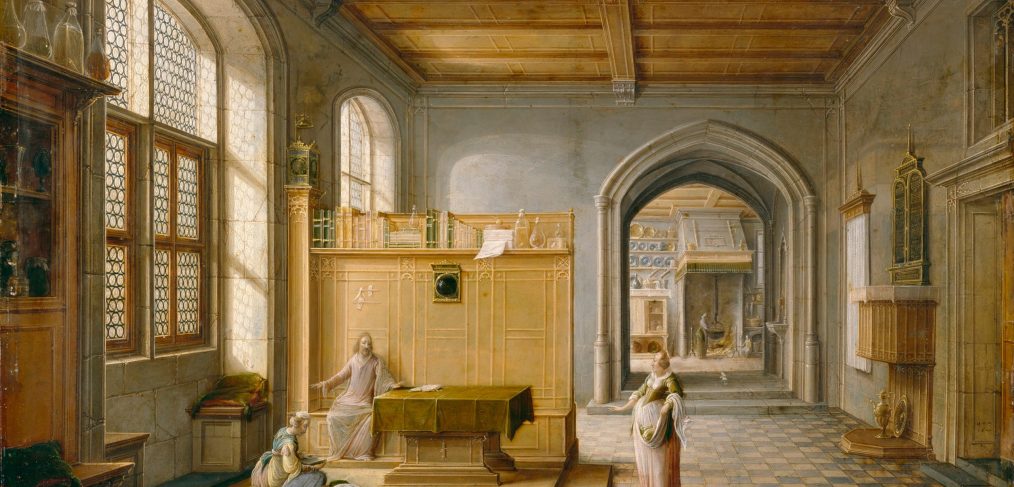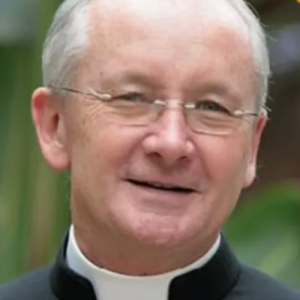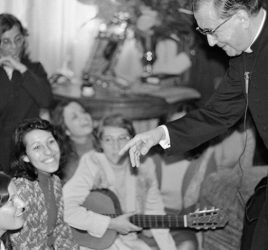
“Martha, Martha”: Combining the Love of Mary with the Work Ethic of Martha
“In the course of their journey he came to a village, and a woman named Martha welcomed him into her house. She had a sister called Mary, who sat down at the Lord’s feet and listened to him speaking. Now Martha, who was distracted with all the serving, came to him and said, ‘Lord, do you not care that my sister is leaving me to do the serving all by myself? Please tell her to help me.’ But the Lord answered, ‘Martha, Martha,’ he said, ‘you worry and fret about so many things, and yet few are needed, indeed only one. It is Mary who has chosen the better part, and it is not to be taken from her’” (Luke10:38-42).
Our Lord is well taken care of in Bethany. These are his friends. The Gospel tells of the arrival of our Lord and His disciples at the house of these friends, Martha and Mary and Lazarus. Later on, our Lord is going to weep when he heard that Lazarus had died.
Bethany is about two miles from Jerusalem. And our Lord stopped there to rest in the home of his friends before going up to the holy city. He felt at home in that place surrounded as he was by joy and affection. That’s how we have to try and welcome our Lord who is in the tabernacle. He’s the most faithful friend that we have. He deserves our loving attention more than anyone else.
And in this warm, friendly environment, the sisters Martha and Mary behaved with naturalness and simplicity. Even as they reveal different attitudes. Martha, we’re told, was distracted with much serving. You get the impression that she may have been the elder of the two. Luke says a woman named Martha received him into her house. She was completely taken up with the work of tending to the Lord and His disciples. There would have been plenty of things to keep her occupied. Possibly it was a numerous group and they had arrived unexpectedly. And understandably Martha wants to welcome our Lord in an appropriate manner.
We know that at a certain moment, she lost her peace of mind. And she became frustrated due to her misreading of the situation. And Mary, on the other hand, sat at the Lord’s feet and listened to his teaching. St. Augustine says she forgets about her sister and sits before him, doing nothing else but listening to his word (St Augustine, Sermon 103, 3).
With the help of divine grace, we have to learn how to live a unity of life which consists of the union of Martha’s and Mary’s attitudes. Our love of God should be inseparable from our apostolic zeal, and our work should be well done for the glory of God. We can also try to work with the knowledge that our Lord is always by our side by living in a certain presence of God in the workplace.
So Martha showing her real sense of trust in her guest, she complains to our Lord. ‘Do you not care that my sister has left me to serve alone? Tell her therefore to help me.’ These are strong words because Jesus is divine love incarnate. She’s saying, ‘Do you not care?’ She gets it all wrong.
So for many centuries, these two sisters have been held to represent two rival lifestyles. According to this traditional interpretation, Mary exemplifies the way of contemplation, a life of union with God. And Martha is seen as the personification of an act of life at work. But Blessed Alvaro del Portillo liked to say that the contemplative life does not consist in simply being at the feet of Jesus doing nothing—that would be a disorder, if not pure and simple indolence.
We are told in, Friends of God [by St. Josemaria Escriva], “For we must find God in our daily job, transforming our professional work into the hinge on which our calling to sanctity rests and turns” (Friends of God, no 62). We can show our love for God through the exercise of the human as well as the supernatural virtues. So a lot of our formation is geared towards growing the human virtues of industriousness, punctuality, order, as well as those of the supernatural virtues. It’s very difficult, possibly even impossible, to have a deep interior life, and at the same time to live a vibrant apostolate, if we lack a serious commitment to our daily work.
For too long, there’s been a mistaken insistence on the supposed incompatibility between secular work and interior life. And so one writer on the theology of work says, “Nevertheless, it is there in the midst of daily work and by means of it, not in spite of it, that God wants to call most Christians to lives of holiness. We are to sanctify the world and sanctify ourselves with a life of prayer that gives divine meaning to earthly tasks” (Illanes, On the Theology of Work).
And so it can be very useful to practice what are called norms of always in our workplace: acts of thanksgiving, acts of faith, acts of atonement, acts of hope. Saint Josemaria said on one occasion while speaking to a large number of people, he said:
You must understand now more clearly that God is calling you to serve him ‘in and from’ the ordinary, material and secular activities of human life. He waits for us every day, in the laboratory, in the operating theater, in the army barracks, in the university lecture room, in the factory, in the workshop, in the fields, in the home and in all the immense panorama of work Understand this well: there is something holy, something divine hidden in the most ordinary situations, and it is up to each one of you to discover it. There is no other way. Either we learn to find our Lord in ordinary, everyday life, or else we shall never find him. That is why I can tell you that our age needs to give back to matter and to the most trivial occurrences and situations their noble and original meaning. it needs to restore them to the service of the Kingdom of God, to spiritualize them, turning them into a means and an occasion for a continuous meeting with Jesus Christ.
That is why I can tell you that our age needs to give back to matter and to the most trivial occurrences and situations, their noble and original meaning. It needs to restore them to the service of the kingdom of God. Spiritualize them, turning them into a means and an occasion for a continuous meeting with Jesus Christ (Conversations with St. Josemaria Escriva, no. 114).
So this involves combining the love of Mary, with the work ethic of Martha. Our Lord responds to Martha with that affectionate advice. “Martha, Martha, you are anxious and troubled about many things. And yet only one thing is needful. Mary has chosen the best part, which will not be taken away from her.” This is as though our Lord was speaking to each one of us. It’s as if he said “Martha, you are worried about worldly affairs. But you’re forgetting about me.” And that’s why we need reminders in our ordinary work of each day, with an image of Our Lady, with a crucifix, through an aspiration, to use human things and human reminders to help us remember that we’re always in the presence of God. And we have to give Him all the glory that He’s due. There’s no separation between our work life and our prayer life. We have to try and turn our work into prayer. He seems to be saying to her, you are deeply concerned about important tasks, but you’re neglecting the most important one of all, which is union with God, personal sanctity.
How very relevant it is for every Catholic today to be reminded of that great message. We can be so caught up with important tasks or deadlines or urgent things that need solving, that we can forget about the most important concern. If your worries lead you to lose presence of God while you work, then those worries are not good for you. Even though your work itself might be good and necessary. St. Paul says you run very well, but outside the course. It’s very important for us to be running on the right course.
Our Lord doesn’t pass sweeping judgments upon Martha or Mary. He responds to Martha’s question with profundity by pointing to what is most important in life, that being the presence of Christ in the house. Our Lord could make the same message to us. Nothing can justify our forgetting our Lord in our daily work. Not even the most important of concerns. We cannot put him, who is Lord of all things, aside for the sake of the things of the world or be so concerned about the harvest of the Lord that we forget the Lord of the harvest.
This article is an excerpt from the meditation Martha, Martha on the podcast “Fr. Conor Donnelly Meditations.” Tune in on Apple Podcasts, Spotify, and your favorite podcast app.
Cover Image: Christ in the House of Martha and Mary (1620) by Hendrick van Steenwijck the Younger




